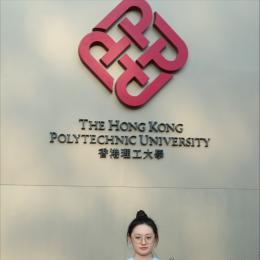
Sept 2026 Entry
4 years
BSc (Hons) in Land Surveying and Geo-Informatics
- 120 (plus 1-credit industrial safety training and non-credit bearing summer training)
BSc (Hons) in Urban Informatics and Smart Cities
- 120 (plus 1-credit industrial safety training and non-credit bearing summer training)
- The Faculty of Construction and Environment International Student Scholarships (FCE ISS) are offered to eligible international students. Please click here for more details.
- Entry scholarships are available for outstanding admittees. Please click here for details.
- Students will be awarded one of the following degrees upon successful completion of the graduation requirements of the programme concerned:
- BSc (Hons) in Land Surveying and Geo-Informatics 土地測量及地理資訊學(榮譽)理學士
- BSc (Hons) in Urban Informatics and Smart Cities 城市信息學及智慧城市(榮譽)理學士
- Students are subject to further assessment criteria, such as students’ choice, GPA, and interview performance for their selection of degrees/majors at the end of Year One.
The option of a Secondary Major in AI and Data Analytics (AIDA) is available to students in the BSc (Hons) in Land Surveying and Geo-Informatics. Admission to a Secondary Major is competitive and subject to different credit requirements for graduation. Please see the Secondary Major Details section for more information.
What's New

- Undergraduate

- Undergraduate
All admitted students will embark on a Common Year One curriculum. Towards the end of year one, students can decide whether to continue with their initial choice or switch to another choice within the Faculty. Those who wish to change to another choice need to join a competitive process through a ranking assessment, which considers a combination of entrance qualification score, Year One GPA, and interview performance.
Aims & Learning Outcomes
The aims of the LSGI Scheme are based on the philosophy that our graduates must be able to cope with the rapidly changing market conditions in Hong Kong, mainland China, and the region, and with the demands of their future professions in land surveying, geo-information technology, utility management and surveying, as well as urban informatics and smart cities. The Department maintains close links with professional bodies and invites industry experts to give guest lectures to students whenever appropriate.
Programme Characteristics
Applicants to the LSGI Scheme can choose between the following two programmes:
BSc (Hons) in Land Surveying and Geo-Informatics
This programme equips students with skills in land surveying/geomatics, geo-information technology and utility surveying/management, enabling graduates to work competently and confidently as geographic information systems professionals in disciplines such as transport and logistics, and environmental, socio-economic, commercial and construction surveying, or as utility professionals in a discipline related to the surveying, condition diagnosis, maintenance and management of underground facilities.
BSc (Hons) in Urban Informatics and Smart Cities
This programme enables students to address the various challenges of global cities related to the rapid process of urbanisation. The main objective of this programme is to educate students on the principles and theories of urban science and to equip them with practical skills in urban analytics so that they can leverage emerging urban big data technologies and values to better understand and serve smart cities.
Upon completion of the programmes, students will be able to
- apply appropriate mathematical and computing skills to solve problems and analyse data;
- comprehend and apply geomatics and smart cities concepts and theories;
- understand geomatics and smart cities technologies and apply them appropriately;
- integrate various geomatics and smart cities technologies to solve problems in a professional, timely and cost-effective manner;
- carry out and manage geomatics and smart cities projects;
- work with and supervise others in accordance with, and abiding by, society’s legal, ethical, and professional standards; and
- respond to advancements in geomatics and related technologies as part of their continuous lifelong learning.
Professional Recognition
The BSc (Hons) in Land Surveying and Geo-Informatics programme is accredited by The Hong Kong Institute of Surveyors (HKIS), the Royal Institution of Chartered Surveyors (RICS), The Malaysia Land Surveyors Board (LJT), The Land Surveyors Board of Singapore (LSB), the Chartered Institution of Civil Engineering Surveyors (CICES) and The Hong Kong Institution of Engineering Surveyors (HKIES).
The BSc (Hons) in Urban Informatics and Smart Cities programme is accredited by The Hong Kong Institute of Surveyors (HKIS) and the Royal Institution of Chartered Surveyors (RICS).
(Subject to regular re-accreditation)
Career Prospects
Graduates of the BSc (Hons) in Land Surveying and Geo-Informatics programme can become professional land surveyors, geo-information technology specialists or utility specialists.
Graduates of the BSc (Hons) in Urban Informatics and Smart Cities programme will have various employment opportunities in the public and private sectors in a wide range of areas related to smart city management, such as construction, telecommunication, information technology, urban planning, transportation and logistics, public health, environmental management, social welfare, finance and real estate.
The curriculum enables students to develop transferable skills and be ready for professional careers through subjects related to the land/utility surveying and geo-informatics industry, urban informatics and smart cities and subjects related to languages, ethics and global engagement. At the end of their first year, students will choose between the BSc (Hons) in Land Surveying and Geo-Informatics and the BSc (Hons) in Urban Informatics and Smart Cities. Students will be selected according to their choice and academic performance. Compulsory subjects are offered each year and in progressive patterns, and a group of electives is offered in both the BSc (Hons) in Land Surveying and Geo-Informatics and the BSc (Hons) in Urban Informatics and Smart Cities. This combination of compulsory and elective subjects equips students with the knowledge and skills needed to understand basic and advanced technologies.
These include basic skills in surveying, positioning and navigation, as well as advanced skills in 3D mapping, modelling, visualisation related to the analysis of terrain, infrastructure, buildings, underwater environments, the underground world and even other planets, with emphases that change over time. Our graduates are of the highest calibre and are well equipped to pursue professional careers or further education after their four years of study.
The option of a Secondary Major in AI and Data Analytics (AIDA) is available to students of the BSc (Hons) in Land Surveying and Geo-Informatics:
Features
The Secondary Major in AI and Data Analytics (AIDA) to BSc (Hons) in Land Surveying and Geo-Informatics provides a platform for students to understand and promote the theory and science of smart cities, gather city-scale data and transform these data into knowledge using the right tools. This programme focuses on emerging developments in big data and in interdisciplinary solutions to the world’s urban challenges.
Remarks
- The minimum credit requirement of taking Secondary Major in AI and Data Analytics (AIDA) is 144 academic credits plus 1 training credit. Actual number of credits may vary depending on the subject choices.
- The Major has 9 credits of double-counting subjects towards the Secondary Major.
- Students who achieve Cumulative GPA of 2.70 or above by the end of Year One Semester Two would be considered for the Secondary Major.
BSc (Hons) in Land Surveying and Geo-Informatics
- 120 (plus 1-credit industrial safety training and non-credit bearing summer training)
BSc (Hons) in Urban Informatics and Smart Cities
- 120 (plus 1-credit industrial safety training and non-credit bearing summer training)
Scheme Leader and Programme Leader of the BSc (Hons) in Land Surveying and Geo-Informatics
Prof. ZHU Xiaolin
BSc, MSc, PhD
Deputy Programme Leader of the BSc (Hons) in Land Surveying and Geo-Informatics
Prof. SHI Guoqiang
PhD
Dr CHEN Si, Sissi
BA, BSc, MSc, PhD
Programme Leader of the BSc (Hons) in Urban Informatics and Smart Cities
Prof. ZHUGE Cheng-xiang, Tony
PhD
Deputy Programme Leader of the BSc (Hons) in Urban Informatics and Smart Cities
Prof. YIN Tiangang
BSc, MEng, PhD
Please click here to view the entrance requirements for international applicants.
For further programme information, please contact:
The General Office (tel.: 3400 3664; email: lsgi.ug@polyu.edu.hk)
To help students gain a deeper understanding of our programme and assess the suitability of prospective students for the programme.
20 - 30 minutes
-
Required.
To evaluate the potential and interest of applicants in the programme, and to assess their language and communication skills and understanding of the industry.
About 20 minutes
Suitable applicants may be invited to attend an interview.
Required.
To evaluate applicants' potential for and interest in the programme and to assess their language and communication skills and understanding of the industry.
About 20 minutes.
Applicants who meet the entrance requirements will be invited to attend an interview.







